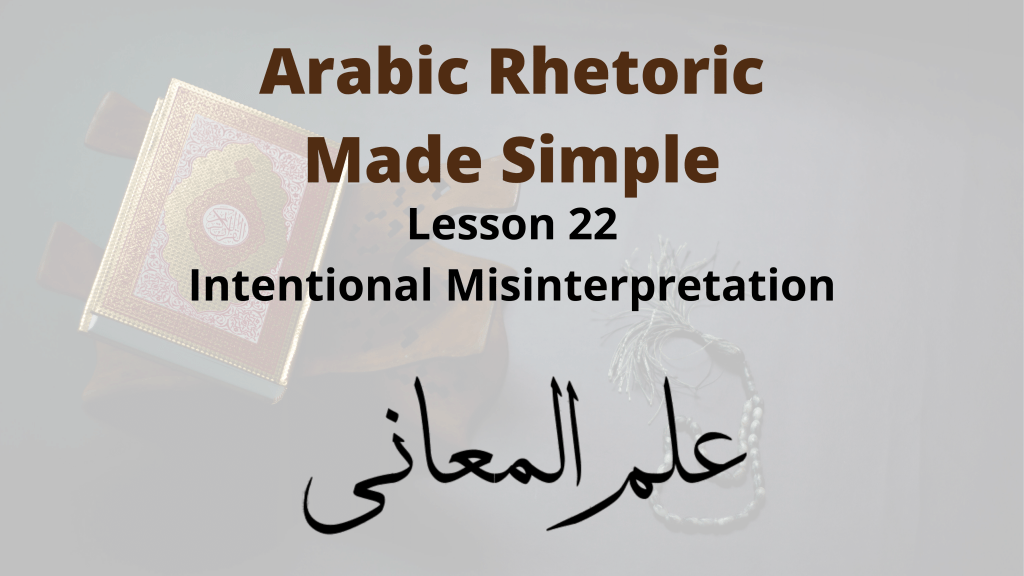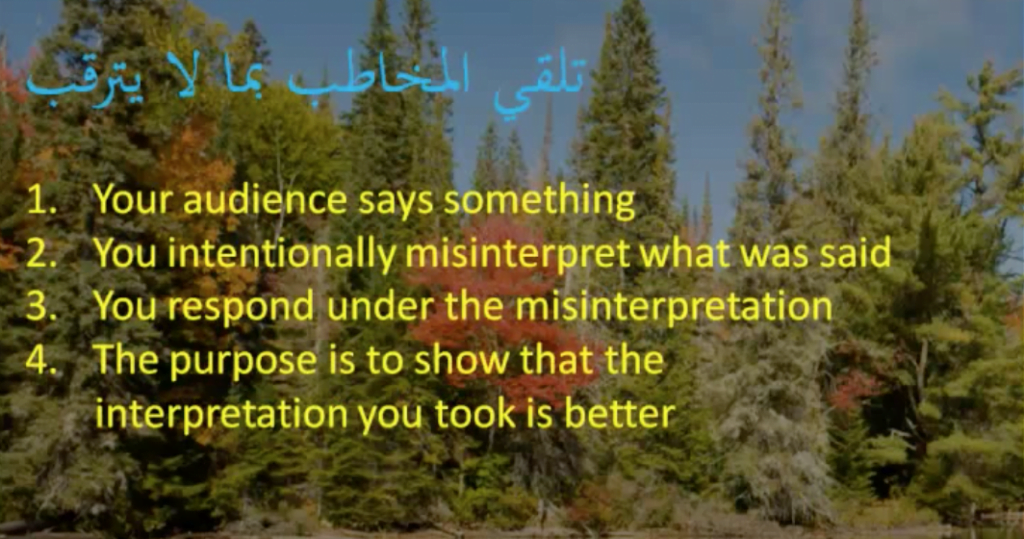In this lesson on Balagha, we are going to learn about intentionally misinterpreting our audience. Something known in Arabic as تلقّي المخاطب بما لا يترقّب.

Example
Let’s start with an example. One day during the caliphate of Hajjaj bin Yusuf, a group of people were talking about the khalifa. Among them was Qabathri, a man of pretty high importance.
He said: “May Allah blacken his face, cut off his head, and permit me to drink his blood”.
So news of this reached Hajjaj, and being the tyrant that he was, he summoned Qabathri for questioning and execution.
Hajjaj said: “Did you really say that about me?”.
And Qabathri responded: “No, I was merely talking about a grape. May Allah ripen it, cut off the top, and allow me to drink it’s juice”.
So unconvinced Hajjaj threatened to kill Qabathri. He said:

Literally this means “I will carry you on chains”. It is a metaphor for execution. But the word أدهم also refers to “white horses”.
So Qabathri responded:

So Hajjaj said: ويلك الأدهم هو الحديد “Curse you, what I mean is chains”. The word حديد means “chains”, but it also means “fast horses”.
So Qabathri then responds: “How generous of you to grant me fast horses”.
Of course, at this Hajjaj became even madder and he ordered his men to take Qabathri.
The story then goes on. They took Qabathri and carried him by the hands and the feet and as they did, Qabathri recited the du’a for safar:
سبحان الّذي سخّر لنا هذا و ما كنّا له مقرنين و إنّا إلى ربّنا لمنقلبون
Implying that the men carrying him were the very horses he was promised!
Definition
Let’s analyze Qabathri’s eloquence. The process he uses goes like this:

- First Hajjaj says something like “I will tie you up in chains”.
- Qabathri intentionally misinterprets that as meaning “I will grant you horses”, by misinterpreting a single word in the sentence in this case.
- Qabathri responds under that misinterpretation by saying: “Yes great men like you grant horses”.
- Intentionally misinterpreting your audience and responding under that misinterpretation is called تلقّي المخاطب بما لا يترقّب.
- The reason this is done is to show your audience that your interpretation is better than what they said.
English Example
An example of this in English can be seen in the famous birthday example.
A friend says to the birthday boy: “Guess what you’re getting for your birthday?”
The birthday boy says: “Older”.
The birthday boy misinterpreted his friend’s intentions and then he responded under that misinterpretation. The reason he did this is to show that the misery of having to face old age is more severe than the joy of getting gifts.
Arabic Example
Let’s take a look at something similar in the Qur’an. Allah says:

Here the believers asked what they should give. Yet Allah responds by explaining to whom they should give. This shows us that whether you give a little or a lot, it doesn’t matter. What is important is to whom you give. Even a little bit in the right place can yield lots of reward and benefit. Similarly, even a lot in the wrong place can yield nothing.
- Proceed to next lesson: Past in Place of Future
- Return to index page: Intro to Ilm Ul-Ma’ani
- Start free lessons: Sign Up for Free Mini-class